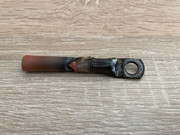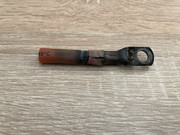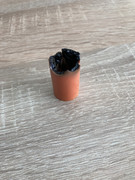

So I noticed the end of the positive battery lead coming out of the inverter looked a slightly different colour to the rest of the cable.. touched it.. yep, warm. Everything instantly switched off!
Took it apart and it's quite a mess. The screw holding the terminal in was still secure so I'm not quite sure where the loose part was; something has clearly not been making a very good connection. This burnt bit of cut-off cable still feels solid, I can't just pull the cable out of the crimp.
These are *not* DIY connections I must stress, these are commercially available Pylontech cables; the long ones. This particular connection has been in place for a year or so, its not something I've recently touched with my DIY adventures.
So morale of the story, check connections regularly. Just keeping an eye on the temperature of my re-crimped cable now, hopefully it fares better.
